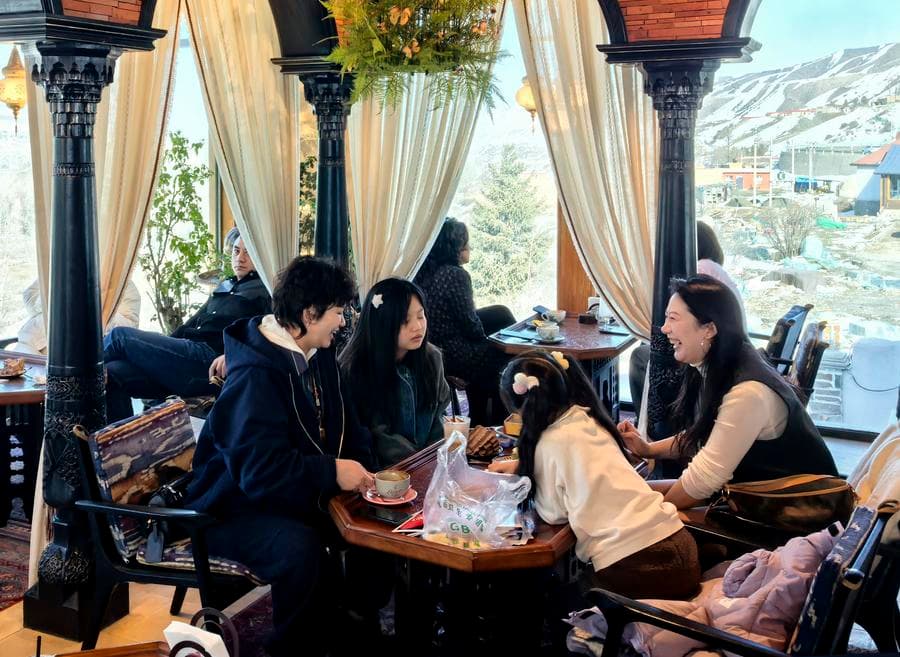Beijing, July 29, 2025 (Qahwa World | Xinhua) – Across China’s scenic countryside, a quiet revolution is brewing—one cup at a time. From the Tibetan highlands of Sichuan to the tropical plantations of Hainan, rural cafés are rapidly transforming into vibrant hubs of cultural, economic, and social renewal.
In Daofu County, nestled in southwest China’s Sichuan Province, traditional Tibetan homes have been reimagined as stylish cafés. These spaces don’t just serve drinks—they serve stories. Alongside lattes and cappuccinos, visitors can savor butter tea, highland barley, and centuries-old Tibetan traditions.
“Sipping a highland latte while listening to folk songs and learning Thangka painting—what a perfect way to unwind,” said tourist Xu Xiaomei, charmed by the unique blend of flavors and heritage.
Even the serving ware is rooted in local identity. “Our coffee cups are handmade from Daofu’s black pottery,” said Gao Yaojun, a hotel manager in the area.
This café-led transformation is not isolated. As of 2024, China has seen the emergence of more than 44,000 countryside coffee shops, many adopting a “coffee+” model that pairs café culture with immersive experiences—ranging from cliffside hikes and elephant watching to craft workshops and plantation tours.
In Guizhou Province, a café perched atop a 200-meter-high cliff has gone viral. Visitors trek through forests and climb the cliffside to reach it, with the entire adrenaline-fueled experience costing around 400 yuan (US$55.70) per person. Similar thrill-seeking café experiences are emerging in Zhejiang and Fujian.
In Yunnan Province, home to China’s largest wild elephant population and its top coffee-growing region, cafés in Pu’er let visitors sip fresh brews while observing elephants roam the forest. Others offer plantation tours and roasting sessions, connecting drinkers directly to the origin of their cup.
In Hainan’s Wanning area, island-based coffee farms invite guests to roast their own beans. Even the grounds are repurposed—turned into eco-friendly crafts such as sand paintings, scented accessories, and decorative murals.
This boom is driven by a powerful urban desire to reconnect with nature. In the first quarter of 2025, rural tourism in China attracted 707 million visitors, an 8.9% increase year-on-year, generating 412 billion yuan in revenue—a 5.6% rise from the previous year.
It’s also reviving rural economies. In Zhejiang’s Anji County, with a population under 600,000, over 300 rural cafés have opened in recent years. Many follow a community co-op model: villagers contribute land or resources, while entrepreneurial teams manage operations. Profits are shared through rent, wages, and dividends.
One notable example is Deep Blue, a café that returns nearly half of its coffee revenue to local shareholders. “You’ve got to admire how brilliantly resourceful these young people are,” a local villager remarked.
The café trend is reversing the tide of urban migration. Young people are returning home to start businesses and build futures. One such example is Wang Han, 27, who left Shenzhen and Kunming to return to his native Xinzhai Village in Yunnan. There, he opened a café and launched an online coffee brand. “There’s something worth coming back for,” Wang said. “Now, visitors from across China come to tour our fields and taste our brews.”
At Deep Blue, the team of 127 staff averages 25 years old, with backgrounds as diverse as medicine and shipbuilding. The café was launched in 2022 by local entrepreneur Cheng Shuoqin and six partners, all from Anji.
Cheng remains optimistic about the sector’s future: “The more well-educated, passionate young people return to the countryside, the brighter its future will be.”
China’s rural café movement is proving that coffee isn’t just a drink—it’s a bridge between tradition and innovation, between economic revival and cultural expression. And in every village cup, there’s a taste of something far greater: a renewed sense of place and purpose.

